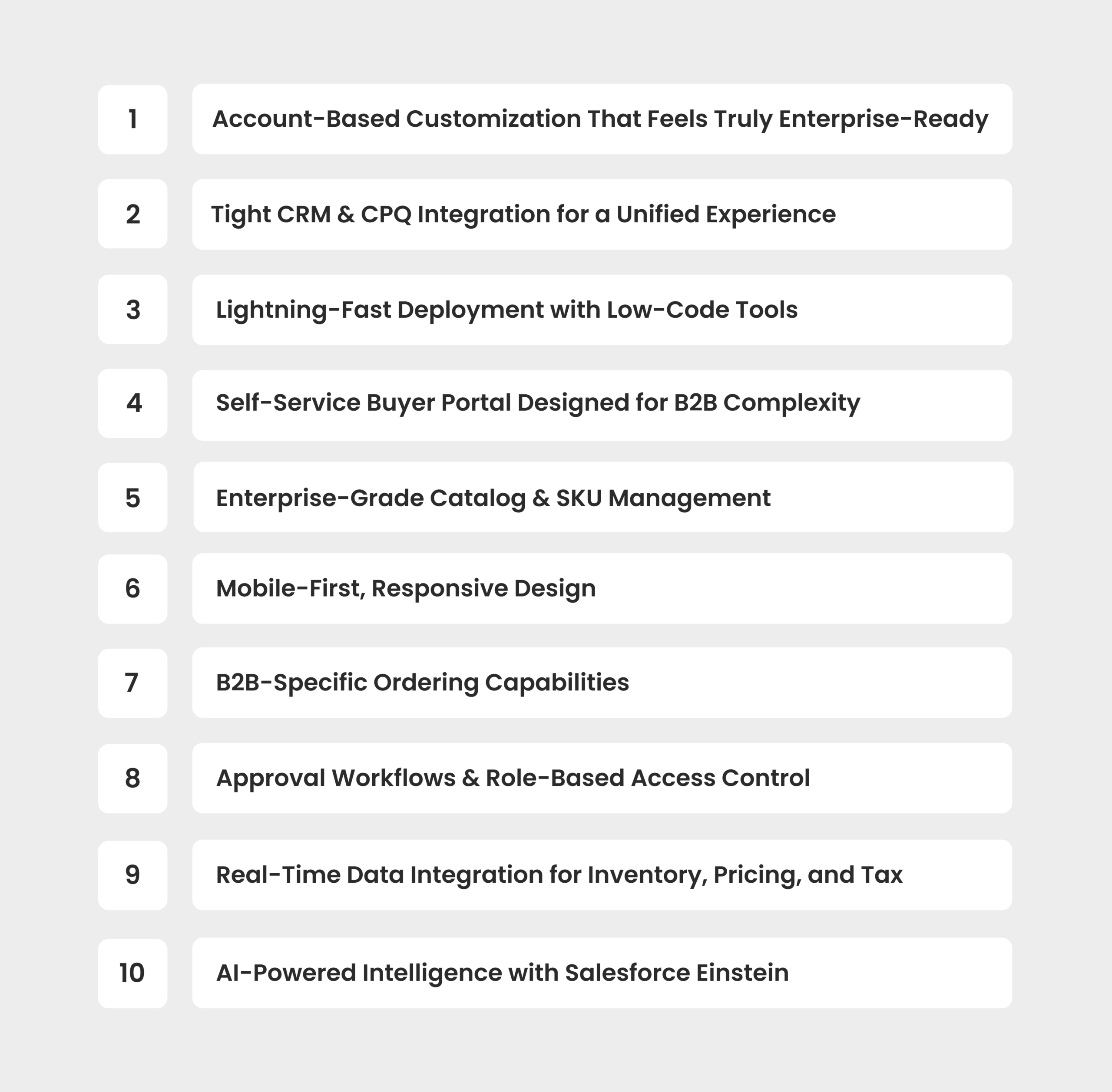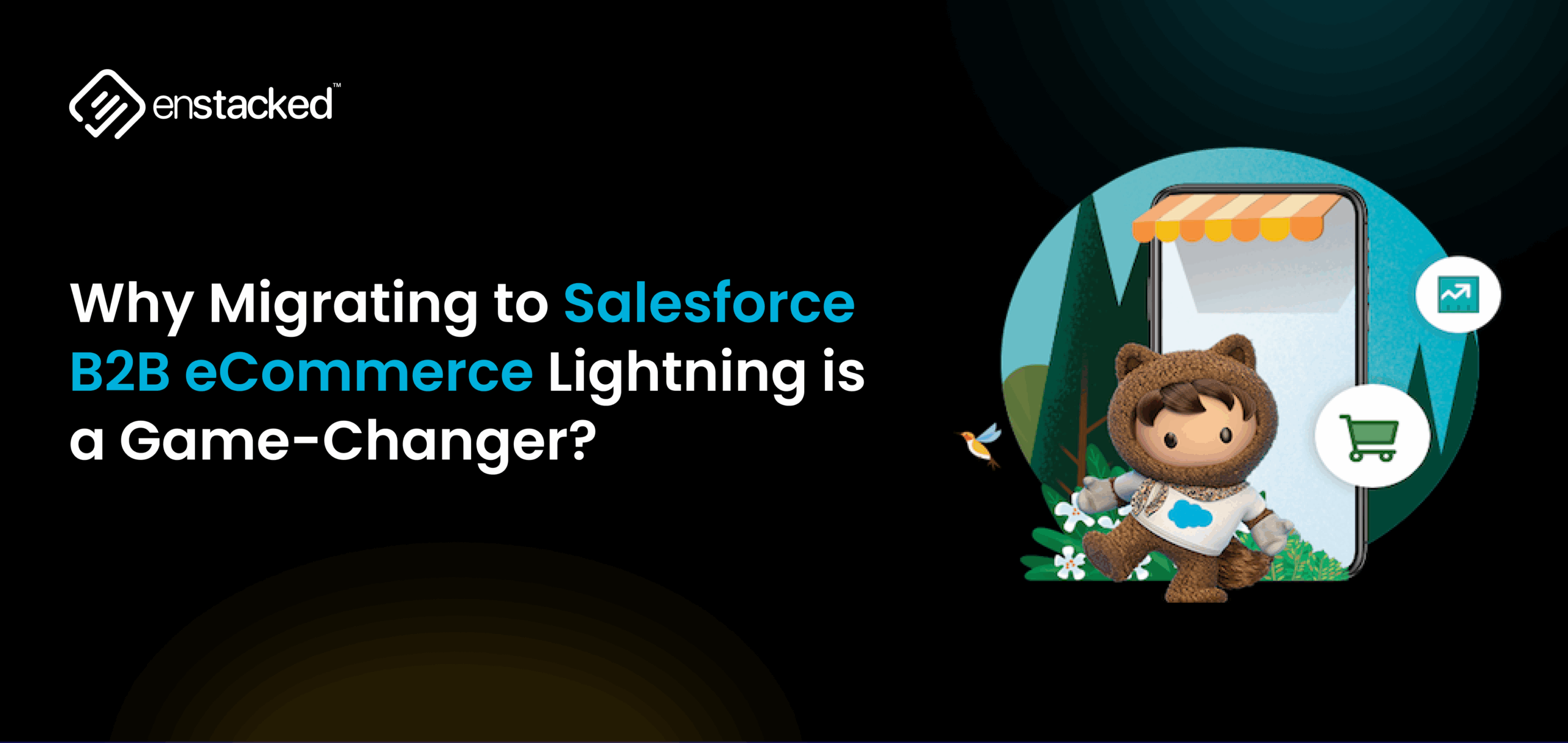Introduction
In boardrooms, Slack threads, and strategy calls across B2B companies, a shift is brewing. No, it’s not just about digitizing sales or launching a shiny new portal; it’s about survival.
But here’s the catch: B2B buying journeys are not B2C in disguise. They’re complex, layered with contracts, custom pricing, account hierarchies, and negotiated approvals. So, where do you go when Shopify is too simple and legacy ERP portals are painfully outdated?
Did you know, only 14% of B2B leaders are satisfied with their current eCommerce platform.
Then, comes Salesforce B2B Lightning, a platform purpose-built to bridge the gap between enterprise complexity and consumer-grade ease.
This blog explores why an increasing number of B2B companies are abandoning their outdated commerce systems and migrating to salesforce b2b Commerce Lightning.
What Is Salesforce B2B Commerce Lightning?
It is an enterprise-level e-commerce platform designed specifically for business-to-business (B2B) selling, built on the powerful Salesforce Lightning Experience.
It empowers manufacturers, distributors, and wholesalers to create fully branded, self-service digital storefronts that are deeply integrated with the Salesforce ecosystem—especially CRM, Sales Cloud, Service Cloud, and CPQ.
Note: Get Connected with the cloud service
But here’s what really sets it apart:
Unlike generic e-commerce platforms, Salesforce B2B Lightning is built for the complexity of B2B. Think:
- Multi-level account hierarchies
- Contract-based pricing and custom catalogs
- Bulk ordering and reorder workflows
- Purchase order payments and quote-to-order functionality
All this is wrapped in a modern, intuitive interface that’s fast, mobile-ready, and personalized.
In simple terms? It’s B2B e-commerce without compromise, where enterprise-level needs meet B2C-like experiences.
Why Leading eCommerce Companies are moving to Salesforce B2B Commerce Lightning?

1. Account-Based Customization That Feels Enterprise-Ready
In B2B, buyers often expect a customized experience that reflects long-standing contracts, negotiated pricing, and unique product needs. Salesforce B2B Commerce Lightning allows businesses to:
Salesforce B2B Commerce allows companies to
- Create customer-specific catalogs
- Assign contract-based pricing tiers
- Customize promotions, terms, and payment methods by account
at the account level, not just user level. This is a game-changer for companies with hundreds or thousands of buyers under unique contracts.
What’s the standout?
With b2b commerce Salesforce Lightning, dynamic record-level visibility, buyers only see what’s relevant to them, reducing confusion and increasing purchase efficiency.
2. Tight CRM & CPQ Integration for a Unified Experience
Unlike standalone eCommerce platforms, Salesforce B2B Commerce Lightning is natively built on the Salesforce platform. That means:
- Real-time sync with Sales Cloud and Service Cloud
- Seamless configuration with Salesforce CPQ (Configure, Price, Quote)
- A unified data model across departments
It means Sales reps, service agents, and buyers all work off the same dataset. No more siloed customer data, miscommunications, or lost deals due to outdated information.
What’s the standout?
You can implement custom flows and Lightning Web Components (LWC) to sync CPQ quotes into the commerce experience or auto-generate quotes post-order.
3. Lightning-Fast Deployment with Low-Code Tools
The Lightning Component Framework enables teams to build storefronts with modular, drag-and-drop tools—no heavy coding required. You get:
- Faster rollout of B2B storefronts
- Ability to quickly adapt or A/B test UX changes
- Quicker time-to-value from your digital investment
For companies under pressure to digitize fast or migrate from legacy systems, Salesforce’s low-code environment removes long IT bottlenecks and speeds up market responsiveness.
What’s the standout?
Instead of relying on third-party code or plugins, you can develop with LWC, which ensures performance, compatibility, and security, along with easy upgrades during platform releases.
4. Self-Service Buyer Portal Designed for B2B Complexity
Today’s B2B buyers want to place orders, reorder, track shipments, and access invoices independently without waiting on representatives. B2B commerce Salesforce Lightning makes this easy with:
- Saved carts and reorder functionality
- Account-specific dashboards
- Status tracking, quote submissions, and return requests
It helps you reduce sales team workload, shorten buying cycles, and meet the modern buyer’s expectations for 24/7 self-service access.
How does it stand out?
Beyond shopping carts, salesforce b2b Lightning lets you build account dashboards, quote submission flows, approval trackers, and order history modules using Apex and Flow. It enables enterprise buyers to self-serve complex workflows 24/7 while boosting retention & reducing involvement of your sales teams.
5. Enterprise-Grade Catalog & SKU Management
Managing thousands or even millions of SKUs across global markets is made easier with Salesforce b2b lightning. No performance lags or management headaches—even if you have a multi-category, multi-brand inventory structure.
It helps you with:
- Custom SKU visibility by account or segment
- Dynamic product filtering
- Integration with ERP for accurate data
B2B commerce Salesforce Lightning scales with your complexity, ensuring smooth navigation for buyers and less friction for your team.
Why does it stand out?
With native support for PriceBookEntry relationships, attribute-based filters, and custom metadata, Salesforce B2B Commerce scales to manage tens of thousands of SKUs efficiently.
6. Mobile-First, Responsive Design
With out-of-the-box templates, Salesforce Commerce Lightning provides a clean, mobile-optimized UI with responsive design standards. These templates follow SLDS, meaning the storefront is mobile-ready, responsive, and ADA-compliant.
This includes:
- Optimized buying workflows for smaller screens
- Touch-friendly product views and checkout flows
- Mobile-specific promotions or catalogs
Something you should know: If you hire dedicated Salesforce developers, they can help you further optimize the mobile experience using conditional rendering within LWC.
7. B2B-Specific Ordering Capabilities
Unlike consumer storefronts where buyers make spontaneous, one-off purchases, B2B buying follows recurring, contract-driven patterns. These are critical for distributors or manufacturers where their customers order based on contracts, supply chains, and stock replenishment needs. It simplifies complex buying cycles, drives repeat orders, and integrates smoothly into enterprise procurement ecosystems.
Salesforce B2B Lightning goes far beyond a basic cart & natively supports:
- Bulk ordering tools
- Quick reorder of past purchases
- Punch-out support and PO-based ordering
- Scheduled and recurring orders
Why does it stand out?
Using Salesforce Flows and Apex triggers, you can enable features like bulk ordering, reorder from history, saved carts, and auto-replenishment orders on a set schedule.
8. Approval Workflows & Role-Based Access Control
Complex purchasing hierarchies are the norm in B2B. With Salesforce eCommerce lightning, complex organizations can confidently transact without bypassing internal protocols. This leads to faster order approvals, fewer email loops, and higher trust from procurement teams.
Salesforce B2B lightning helps mirror a customer’s internal structure with:
- Multi-step approval workflows
- Custom buyer roles (e.g., approver, requester, procurement head)
- Budget thresholds and spending caps
Something you need to know: You can go for this Salesforce implementation using Flow Builder, custom Apex logic, and role-based access control through Sharing Settings. The approval logic is tailored using Record-Triggered Flows, with audit logs stored in custom objects for tracking.
9. Real-Time Data Integration for Inventory, Pricing, and Tax
By integrating with ERP, Salesforce CPQ, and fulfillment systems, B2B businesses can show:
- Live inventory availability
- Real-time contract pricing
- Accurate shipping timelines and taxes
Did you know, Companies that integrate eCommerce platforms with ERP and CRM systems report 2.2x faster order fulfillment and 30% fewer errors.
This ensures accuracy, builds trust, and prevents unnecessary Salesforce implementation cost. Buyers see exactly what’s in stock, what it costs for them, and how fast it will ship, no surprises post-checkout. It also minimizes order changes, returns, and costly manual validations.
10. AI-Powered Intelligence with Salesforce Einstein
Einstein AI elevates both the buyer and seller experience. Your buyers get a more personalized experience with less effort, while your sales teams can focus on higher-value tasks. It leads to larger cart values, faster product discovery, and smarter strategic selling powered by data, not guesswork.
Salesforce customers using Einstein AI see a 26% increase in average order value and 33% faster deal cycles.
- Smart Product Recommendations
- Predictive Search Results with ML-driven indexing.
- Sales Rep Enablement: AI can suggest cross-sell or upsell opportunities via “Next Best Action” directly within the CRM.
Why it stands out?
You can integrate Einstein components into the storefront using LWC and Einstein APIs. For larger deployments, you can use Einstein Discovery to build custom models trained on past transaction data, industry type, or seasonal trends.
To Wrap it Up!
B2B businesses can no longer afford clunky portals, fragmented systems, or slow ordering workflows. Salesforce B2B Commerce Lightning brings the agility, intelligence, and personalization modern buyers demand, backed by the power of the Salesforce platform.
And if you’re looking to migrate to Salesforce B2B Commerce Lightning or need help implementing Salesforce B2B Lightning features tailored to your business model, Enstacked Technologies can help.
We’re a trusted tech partner, and you can hire dedicated Salesforce developers who understand the nuances of B2B Commerce Salesforce Lightning inside and out. Whether you’re a startup scaling operations or an enterprise modernizing legacy systems, hire dedicated developers from India, and we’ll make sure your transition is smooth, efficient, and future-proof.
Let’s build a commerce experience your buyers will love—and your ops team will thank you for.
Frequently Asked Questions(FAQs)
What exactly is Salesforce B2B Commerce Lightning, and how does it differ from Classic/CloudCraze?
Salesforce B2B Commerce Lightning is the modern, scalable version of Salesforce’s B2B eCommerce platform—built on the Lightning Experience. Unlike Classic (CloudCraze), it offers faster performance, a modular component-based structure, mobile optimization, and seamless integration with other Salesforce Clouds.
Why migrate from Salesforce B2B Commerce Classic (CloudCraze) to Lightning?
Migrating to Salesforce B2B Commerce Lightning gives you faster storefronts, better UX, mobile support, and access to Einstein AI. Classic is no longer actively enhanced, while Lightning ensures future-proof performance and deeper CRM integration.
Will Lightning improve storefront performance and SEO?
Yes. Salesforce B2B Lightning improves load speed, Core Web Vitals, mobile UX, and supports clean URLs and structured data—all boosting your B2B eCommerce SEO and buyer experience.
Can Lightning Commerce be integrated smoothly with other Salesforce Clouds?
Absolutely. Salesforce B2B Commerce Lightning connects natively with Sales Cloud, Service Cloud, CPQ, Marketing Cloud, and Experience Cloud, offering a fully integrated B2B eCommerce Salesforce solution.
